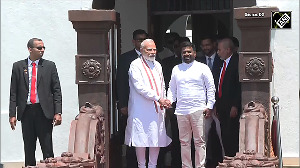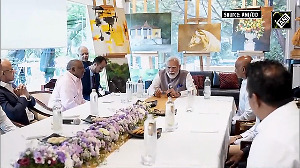From being one of the largest recipients of foreign direct investment among the developing countries, India is confident of surging ahead to become a key global investor, Commerce and Industry Minister Kamal Nath has said.
"Today India actively seeks FDI from the US, but India is also eager to invest in the US," he said at a conference of the US-India Business Council in Washington on Wednesday that took stock of bilateral ties in the last three decades and identified opportunities for enhancing cooperation in the next 30 years.
To drive home his point, the minister pointed out that Indian investments in the UK and Australia had already exceeded investments from the two countries in India.
'India to be world's knowledge hub'
Though he felt two-way investments were good to bind relations, he said they alone were not enough to hold them together and called for greater transfer and exchange of technology.
"It (ties) must be underscored by technology transfer and technology exchange," Nath said.
Predicting that bilateral trade would expand, the minister hoped that the year 2035 would usher in better Indo-US ties that cover not only peace and security issues but closer economic and trade ties.
In 2004, Indo-US trade touched $21 billion with the US accounting for 28 per cent of India's total trade. Washington also accounted for 20.15 per cent of India's FDI receipts in 2004.
Stating that the year 2035 would see the "arrival of India", Nath said the country would become a "knowledge hub of the world -- a hub, which will serve the future workers in ways unimaginable today through a convergence of technologies."
"We no longer discuss the future of India. We say 'The future is India'."
He said in the last 14 years, there had been a "sea change not only in the world's perception about India's future, but in our own perception about ourselves."
"A decade and a half ago, the prospect of India becoming a major player in the global economy seemed a distant dream, only a theoretical possibility," he noted.
Kamal Nath also predicted that in 30 years, India "would certainly have achieved" 100 per cent literacy, become a developed country, enjoy the same fundamentals as the US and should have resolved the vexed Kashmir problem with Pakistan.
Former US Secretary of State Henry Kissinger was conferred the "International Statesman Contributing Most to the Indo-US Strategic Partnership" award at the conference.
The USIBC's award for "the US Company Contributing Most to the Indo-US Commercial Relationship" went to General Electric, while Amit Mitra received the Award for "Promoting an Enduring Indo-US Relationship".
Experts and officials at the USIBC conference predicted India's emergence as a political and economic power and added it could act as a key neutralising force against China's growing clout.
Kamal Nath said he would not like to compare India with China, adding comparisons were always "invidious". He, however, quoted a top executive of a Japanese multinational corporation as telling him during a recent Tokyo visit that Japanese investments in China had slowed down.
"It's very easy to get into China but we find it difficult to stay there and it is very difficult to get into India but very easy to stay there," the minister quoted the Japanese executive as saying.
Agreeing that India, with its nuclear arsenal and immense human resource potential, would emerge as a "great power," Kissinger said it was unlikely New Delhi would be part of any US design to become a counterweight to China.
He said there would be "increasingly close cooperation" over the next decade between India and the US, but he rejected any notion that the Washington would use New Delhi as a counterweight to Beijing, whose growing military, economic and political muscle has sparked concerns among some groups within the US administration.
"India will be concerned with its own security and independence and it will make its judgement on that basis. It should not be part of an American design to counterbalance China. And it won't be, anyway," Kissinger said.






 © 2025
© 2025